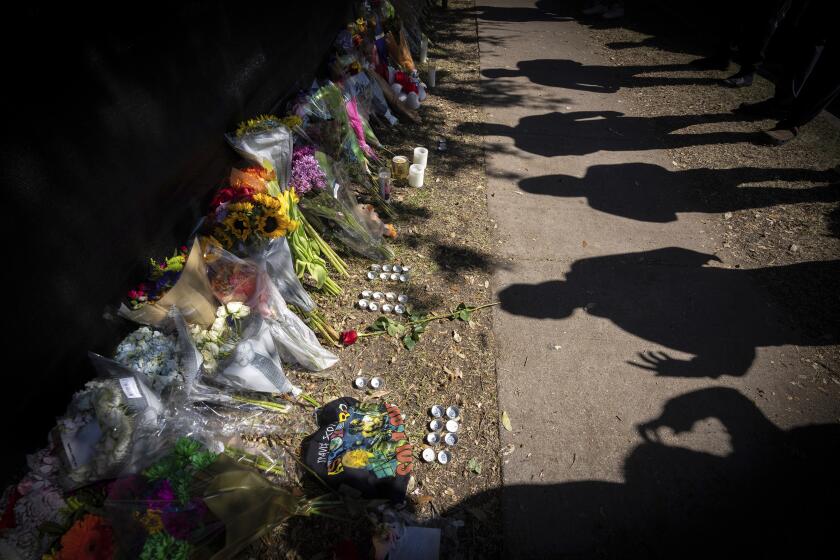Milosevic Deploys Forces to Quell Protest
Thousands of riot police armed with tear-gas rifles blockaded the central part of this capital Thursday, strangling an anti-government demonstration in a new show of force by Serbian President Slobodan Milosevic.
The police deployment was seen as an attempt by Milosevic to break the back of the most sustained opposition to his nine-year regime. Students, politicians and ordinary Serbian citizens have parlayed protest over election fraud into a demand for profound political change in what they regard as one of Europe’s last Communist governments.
In a significant blow to the protest movement, police enforcing an eleventh-hour ban on street demonstrations prevented supporters from arriving at Thursday’s rally and corralled those who did into a single downtown plaza.
*
The opposition coalition known as Zajedno, or Together, for the first time in 39 days of protest was forced to limit to a couple of blocks its ritual march through the city.
But thousands of supporters defied or evaded the police and gathered in subfreezing temperatures in snow-covered Republic Square to blow whistles, wave flags and chant slogans.
“Who can stay longer in the streets, us or them?” said Zoran Djindjic, one of Zajedno’s three leaders. “Whatever the length of time Milosevic stays, we will stay one day longer.”
Saying they feared arrest, Zajedno leaders before the rally appeared visibly shaken as their supporters were surrounded by cordons of helmeted police. With each passing day, opposition leaders are forced to guess what Milosevic’s next move will be, while grappling with their own dilemma over how to maintain the momentum of their campaign.
“If any one of us is not here tomorrow,” Djindjic later told the crowd, “you must go on without us. If they arrest us, do not be provoked.”
Police used batons and shields to push crowds out of the streets Thursday, but in contrast to running battles Tuesday--the first day of significant violence in the ongoing unrest--both sides showed restraint.
Zajedno said three of its supporters were injured Thursday while trying to disperse peacefully. An opposition member died Wednesday after reportedly being beaten in a scuffle with members of Milosevic’s Socialist Party.
A minute of silence was observed for the 40-year-old victim during the rally, where demonstrators chanted, “Murderer! Murderer!”
“Can you imagine that a president of a country loses an election and then provokes a civil war?” Djindjic said. “Can you imagine what he’d do if he lost a national election? He’d provoke a world war!”
Those supporters who did make it to the rally showed the mettle and perseverance that have surprised most observers here. A 59-year-old retired lawyer said she walked for two hours through side streets to reach the plaza.
*
“The regime’s plan is to scare people, but we won’t let them succeed,” said a Serbian movie producer who joins the demonstrations every day. “We will change the route every day if we have to. That is our only strategy. They can’t block the whole city.”
State television, controlled by Milosevic and given to 1950s-style Bolshevik propaganda, on Thursday night declared victory over the opposition. “Finally, they understand that it is not advisable to disturb traffic every day,” the evening news announced.
The opposition is counting on a gradual withering away of Milosevic’s hold on power. As this week proved, his 80,000-strong police force, well-paid and built up over the last few years to the detriment of the army, appears ever loyal. But there were other signs of erosion.
The New Democracy Party, one of three parties in the ruling leftist coalition, announced Thursday that it will consider quitting the government if demonstrations are crushed violently. Although the party is tiny, its defection would be embarrassing.
And Montenegro, fearful of having to share any international punishment meted out to Belgrade, hinted at the first step toward seceding from Yugoslavia. Tiny Montenegro is the last republic left with the larger Serbia in today’s rump Yugoslavia. A senior official, Vice Premier Slavko Drljevic, was quoted in Belgrade newspapers as saying Montenegro would print its own currency if Serbia continues to print money. Milosevic’s regime is believed to have printed millions of dollars worth of dinars to pay overdue salaries and pensions to people who might otherwise feel the need to join the demonstrations.
*
The disintegration of the Yugoslav federation in 1991 was prompted in part by Milosevic’s printing of money without consultation with other republics.
In Washington on Thursday, a State Department spokesman continued earlier U.S. condemnations of the recent actions by the Belgrade regime, saying: “We repeat our call on the Serbian authorities to show restraint and to not interfere with the protesters’ democratic rights. We continue to hold Milosevic responsible for any violence which may occur.”
After street fighting erupted Tuesday, U.S. Deputy Secretary of State Strobe Talbott warned Milosevic that he faced economic reprisals and continued international isolation if he unleashed his security forces to crush dissent.
Serbian political sources said Milosevic is gradually freezing some contact with Western diplomats. He reportedly refused to meet with U.S. Charge d’Affaires Richard Miles, who requested an emergency meeting but was received by Foreign Minister Milan Milutinovic instead.
More to Read
Start your day right
Sign up for Essential California for news, features and recommendations from the L.A. Times and beyond in your inbox six days a week.
You may occasionally receive promotional content from the Los Angeles Times.






